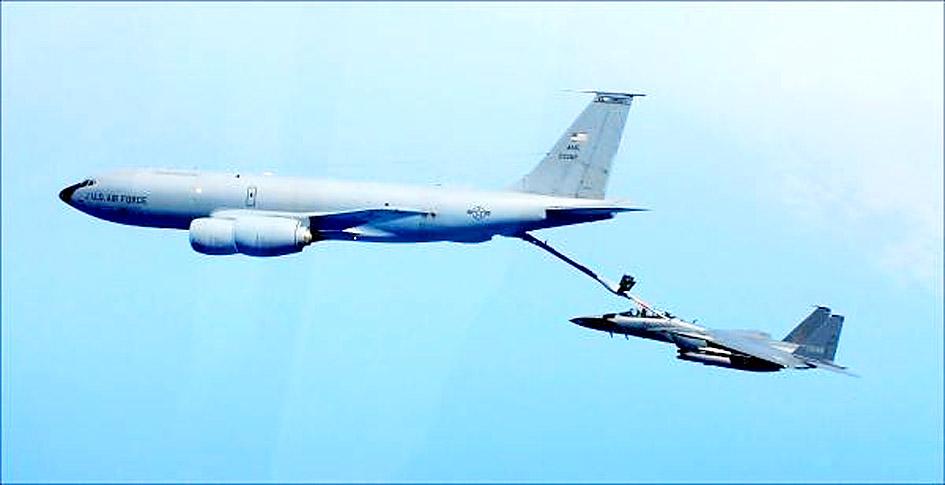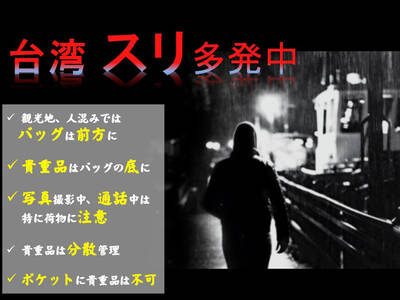A US aerial refueling aircraft came very close to an EVA Airways jet in the airspace over southern Taiwan, a military aviation news Web site said.
A report published by Alert 5 on Tuesday said that automatic dependent surveillance–broadcast (ADS-B) data captured by planfinder.net on Wednesday last week showed a US Air Force KC-135 tanker “coming less than 1,000 feet [305m] vertically with EVA Air flight BR225 as both aircraft crossed path south of Taiwan” that morning.
The report included an audio recording of a female controller from the Taipei air traffic control center telling the unidentified aircraft that it was interfering with flights in the Taipei flight information region.

Photo: Reuters
She also told the crew of the unidentified aircraft to contact the control center, the recording showed.
The incident was also reported on Wednesday by the South China Sea Strategic Situation Probing Initiative at Peking University’s Institute of Ocean Research, which tracks the US’ aerial reconnaissance activities in the region.
The Civil Aeronautics Administration (CAA) confirmed that the control center had detected both the US tanker and the EVA plane that day, adding that it had relayed the information to the EVA airplane and asked it to stay alert.
Because the unidentified aircraft did not respond to the control center’s request for identification, it was unable to ascertain its ownership, the CAA said.
EVA said that crew members on the BR225 flight from Taipei to Singapore were notified by a controller at the Taipei air traffic control center that there was an unidentified aircraft near its flight path.
The airplane continued on its designated route, and was not told to adjust its altitude or direction, EVA said.
It is fortunate that there were no casualties, but the increased activity by US military aircraft in the area, including refueling, poses more risk to aviation safety, strategy expert Chang Ching (張競) wrote on Facebook.
If the foreign news Web site did not disclose the incident, the public would not have known about it, Chang wrote, asking if the government tried to conceal it due to political considerations.

GENSLER SURVEY: ‘Economic infrastructure is not enough. A city needs to inspire pride, offer moments of joy and foster a sense of belonging,’ the company said Taipei was named the city with the “highest staying power” in the world by US-based design and architecture firm Gensler. The Taiwanese capital earned the top spot among 65 cities across six continents with 64 percent of Taipei respondents in a survey of 33,000 people saying they wanted to stay in the city. Rounding out the top five were Vietnam’s Ho Chi Minh City (61 percent), Singapore (59 percent), Sydney (58 percent) and Berlin (51 percent). Sixth to 10th place went to Monterrey, Mexico; Munich, Germany; Sao Paulo, Brazil; Vancouver; and Seoul. Cities in the US were ranked separately, with Minneapolis first at

The Japan-Taiwan Exchange Association has cautioned Japanese travelers to be vigilant against pickpockets at several popular tourist spots in Taiwan, including Taipei’s night markets, the Yongkang Street area, Zhongshan MRT Station, and Jiufen (九份) in New Taipei City. The advisory, titled “Recent Development of Concerns,” was posted on the association’s Web site under its safety and emergency report section. It urges travelers to keep backpacks fully zipped and carried in front, with valuables placed at the bottom of the bag. Visitors are advised to be especially mindful of their belongings when taking photos or speaking on the phone, avoid storing wallets and

Scoot announced yesterday that starting in October, it would increase flights between Taipei and Japan’s Narita airport and Hokkaido, and between Singapore and Taipei. The low-cost airline, a subsidiary of Singapore Airlines, also said it would launch flights to Chiang Rai in Thailand, Okinawa and Tokyo’s Haneda airport between December and March next year. Flights between Singapore and Chiang Rai would begin on Jan. 1, with five flights per week operated by an Embraer E190-E2 aircraft, Scoot said. Flights between Singapore and Okinawa would begin on Dec. 15, with three flights per week operated by Airbus A320 aircraft, the airline said. Services between Singapore

ENDORSING TAIWAN: Honduran presidential candidate Nasry Afura said that Honduras was ‘100 times better off’ when it was allied with Taipei The Ministry of Foreign Affairs yesterday said it would explore the possibility of restoring diplomatic relations with Honduras based on the principle of maintaining national interests and dignity. The ministry made the remarks in response to reporters’ questions regarding an article titled: “Will Taiwan Regain a Diplomatic Ally?” published in The Diplomat on Saturday. The article said Honduras’ presidential election in November could offer Taiwan the chance to regain an ally, as multiple candidates have promoted re-establishing diplomatic relations with Taiwan. Honduras severed diplomatic ties with Taiwan in March 2023 in favor of Beijing, but since switching its diplomatic recognition,